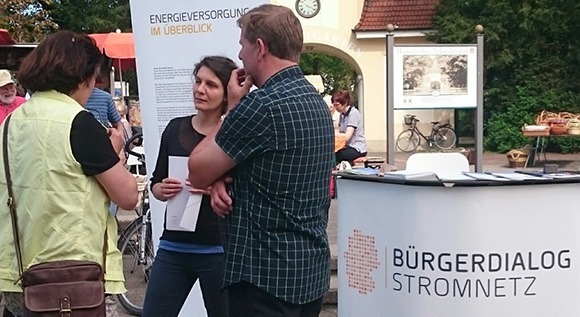
The German energy transition is very much a joint effort that requires transparency and dialogue. For the reforms to be a success, they will have to be endorsed by the public. Whilst a large majority is in favour of the energy reforms per se, there is still a certain lack of acceptance for the infrastructure projects that are needed. Infrastructure projects such as the construction of electricity lines have an impact on people's lives and on the environment. It is therefore understandable that they should give rise to wariness and concern. At the same time, citizens are coming forward in ever growing numbers to actively shape the transition of our energy supply and are calling for more opportunities to get involved.
Dialogue is way of reaching public consensus on major infrastructure projects of the kind that are needed to make the energy reforms a success. This can only work if there is a new culture of dialogue which takes account of the specifics of each case and of the interests of all those affected.
This is why, since January 2015, the Federal Ministry for Economic Affairs and Energy has been supporting the initiative for a public dialogue on grids. This initiative follows a regional approach and focuses on so-called hotspots, i. e. municipalities where there is a particularly strong need for communication and discussion.
Starting in spring 2015, new citizen's bureaus for all matters linked to the expansion of the grids are to established to act as local points of contact for the public. These citizens' bureaus will provide information to the public on a case-by-case basis. Their work will be tailored to the needs and specifics of their respective regions. This is to ensure that the public's need for information is met, even where grid-expansion projects require long planning periods with decisions being taken at various levels, and irrespective of the individual scope for decision-making.
The citizens' bureaus will provide information to the public and also feed the public's input back to the authorities. Anybody affected by the expansion of the grid as well as the general public will be able to submit their questions, comments and queries at any time and receive a reply. In this way, the citizens' bureaus will pass on the expertise and the input of locals, which can make all the difference when it comes to resolving issues at local level.
Various formats of events, ranging from citizens' conferences to information markets, to discussion evenings where locals have the opportunity to get together in small groups, are also to be rolled out. This will allow locals to learn about the projects that are envisaged, to voice their concerns, and to discuss possible solutions — preferably before the formal process of involving the public begins. Mediation services will also be available where needed to supplement this dialogue.
A new internet platform will soon provide information on the initiative and open up even more ways for the public to get involved — including the opportunity for citizens to join the online debate in the dedicated online forum, which also makes it possible for them to vote on the proposals being made, and the opportunity to chat with experts. This online tool will ensure that the initiative covers the whole of Germany — even areas where there is no citizens' bureau.
Image Upload
Add image